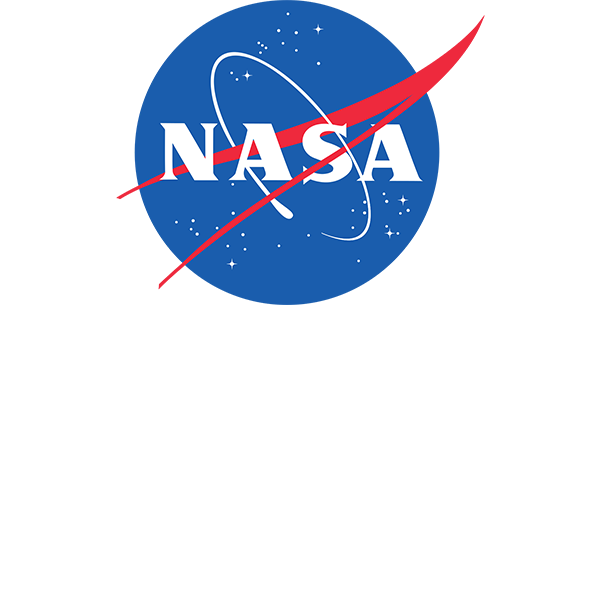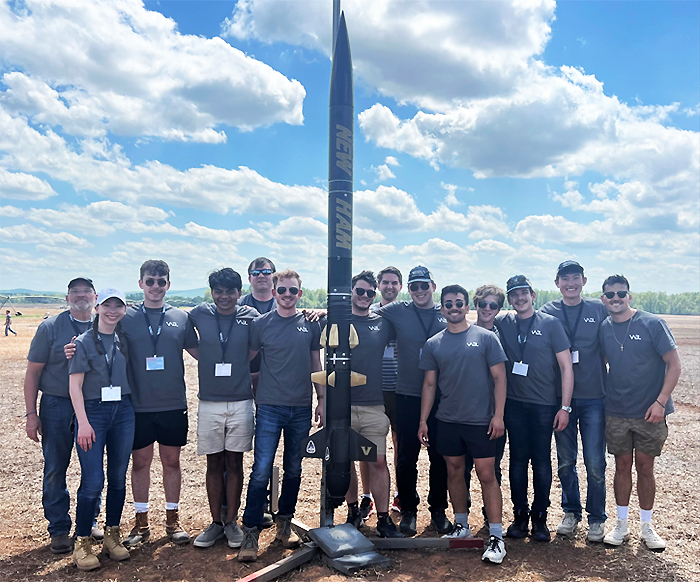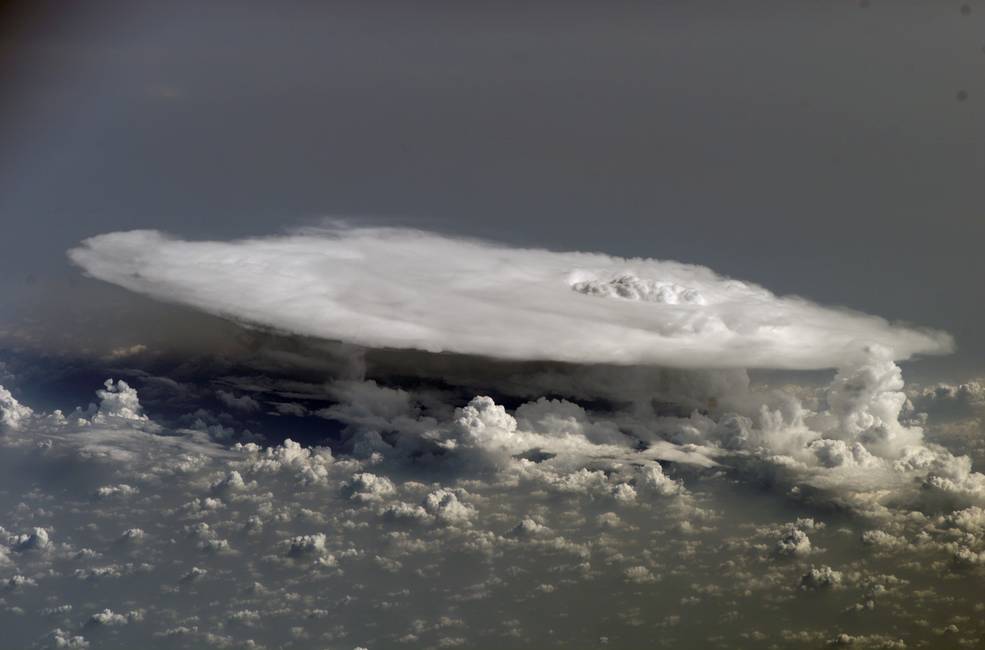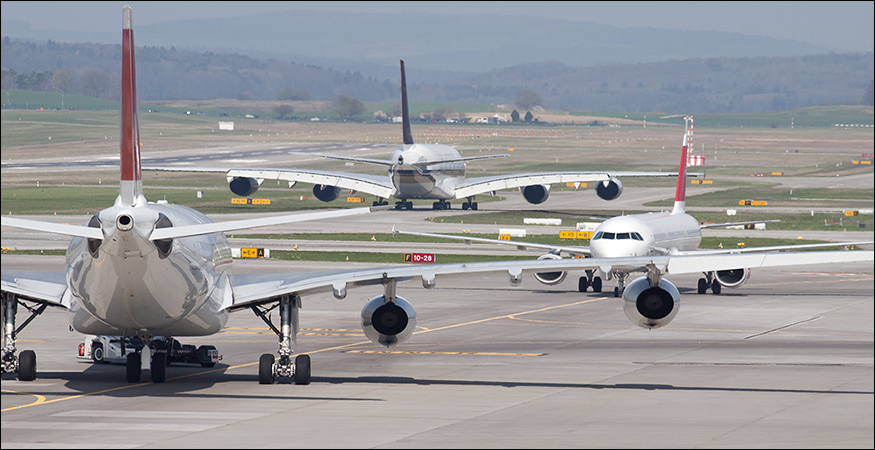

-
$2.43M
NASA Funding at Vanderbilt
FY 2023
Vanderbilt Rocket Team collects coveted Altitude Award in 2023 NASA Student Launch competition
The Vanderbilt University rocket, New Ham, successfully flew to within 4 feet of its 4500-foot altitude target to place first and collect the coveted Altitude Award in the 2023 NASA Student Launch competition. The team also earned a first-place award in the STEM Engagement category and placed second in the Project Review category.
The NASA student launch competition is a NASA-conducted and aerospace industry-evaluated engineering design challenge built around a NASA mission. It is an intense eight-month contest involving payload and rocket designs, project reports, design reviews, outreach activities and website design, followed by a grand finale launch each April. The Marshall Space Flight Center Office of STEM Engagement manages the student launch to stimulate innovation and advance NASA’s mission through collaboration with educational institutions.
This is Vanderbilt’s 16th year to participate in the annual NASA event and teams have won the overall championship seven times and the payload design award eight times. Vanderbilt’s rocket design this year was praised for its “sophisticated altitude control fin system” which allowed the team to hone in on their target altitude, running calculations in real time during their rocket ascent.
The Vanderbilt team won the STEM engagement award and received a $1,000 prize from the National Association of Rocketry. They engaged over 1,400 students, educators and adults in a variety of activities, including biomimicry and aerodynamics, reaching a diverse group of participants from K-12 school groups to the YMCA and the Nashville Zoo.

Vanderbilt University professor to lead NASA mission to study ice clouds
Vanderbilt has been chosen to lead a NASA satellite mission, supported by a grant of up to $37 million, aimed at better understanding Earth’s high-altitude ice clouds. The mission will underscore Vanderbilt’s cutting-edge contributions to comprehending our planet’s climate.
Vanderbilt’s climate research portfolio is growing, and this new NASA mission will provide opportunities for graduate students, postdocs and researchers to embed themselves in cutting-edge technological developments to better understand the climate system.
The team will employ an advanced instrument known as the polarized submillimeter ice-cloud radiometer, or PolSIR. Supported by two “CubeSat” satellites that measure clouds’ daily cycle of ice content, the project will help improve climate forecasts.
A large team of engineers and scientists will work together over several years to put in place all the bits and pieces needed for the mission. The team behind the mission proposal was about 30 engineers and scientists.
The mission is part of NASA’s Earth Venture class, a program dedicated to propelling innovative, cost-effective science missions that broaden knowledge of Earth’s intricate weather systems. The grant, capped at $37 million, is for life cycle costs and does not include launch costs. The goal is to launch the satellites for this mission by the end of 2027.
NASA Science Mission Directorate funding at Vanderbilt
The Science Mission Directorate conducts scientific exploration that is enabled by access to space. From space, in space, and about space, NASA SMD supports research that advances our understanding of our planet and universe. Projects funded at Vanderbilt include:
- Conducting basic and applied research of new technologies and design techniques for circuits that will have to operate in the cold-temperature and high-radiation environment of space, including on Jupiter’s moon Europa.
- Developing plans for the future of gravitational wave astronomy, which has the potential to fundamentally change our understanding of the universe.
- Using Earth-observing satellites to take an inventory of submarine shallow volcanic eruptions and examine their impact on the planet.
- Outlining actions NASA can take to increase diversity, equity, inclusion and accessibility in the leadership of space mission proposals submitted to the NASA Science Mission Directorate.
Tennessee Space Grant Consortium
Vanderbilt is the lead institution for the Tennessee Space Grant Consortium, a NASA educational program that is composed of affiliate institutions from around the state. The goal of the Space Grant Consortia is to inspire students from K-12 through the graduate level to become excited about and pursue further education and careers in NASA-related fields and the greater STEM arena. The TSGC provides scholarships and fellowships to undergraduate and graduate students at participating institutions, sponsors undergraduate STEM competition teams, promotes research and teacher training, conducts outreach activities throughout the state, and supports Tennessee student participation in NASA internship programs. During FY 2023, the TSGC provided significant financial and/or experiential support to more than 40 students statewide and had an impact on hundreds more.
NASA Space Technology Graduate Student Research Opportunity
A fourth-year graduate student in the interdisciplinary materials science program was awarded a fellowship by the NASA Space Technology Graduate Research Opportunities. He received the award for his work studying nanoscale design in advanced integrated photonics and identifying mechanisms for changes in photonic devices and circuits due to the harsh environment in space. He is collaborating alongside Vanderbilt’s Institute for Space and Defense Electronics and NASA Goddard Space Flight Center during his term as a NASA Space Technology Graduate Student Research Opportunities fellow.

Next-gen air safety systems incorporating risk models and data analysis developed by Vanderbilt engineers
As the nation’s skies become more crowded with commercial air traffic and U.S. air traffic control systems struggle with staffing and aging infrastructure, the risk of narrowly avoided collisions in the air and on the tarmac has increased significantly in the last five years. Most of the close calls are the result of human error, according to the U.S. Federal Aviation Administration.
Following the recent conclusion of a $10 million, five-year NASA grant, research conducted by experts from the Vanderbilt School of Engineering can be used to integrate risk models and relevant data sources into future air traffic management systems. The project was part of NASA’s Aeronautics University Leadership Initiative that gives top academic centers and their industry collaborators a larger role in shaping best practices and translating them into commercial use. Industry partners Optimal Synthesis Inc. and Southwest Research Institute joined Arizona State University and NASA to round out the Vanderbilt team. The Vanderbilt task focused on diagnosis and prognosis of safety events during cruise, landing and takeoff. The team drew on its expertise in areas of validation and safety assurance as well as machine learning, uncertainty management, risk assessment and prognostics.
For more information, please contact the Vanderbilt Office of Federal Relations:
Christina West 202-216-4370 | Heather Bloemhard 202-216-4368
federalrelations@vanderbilt.edu
FY 2023